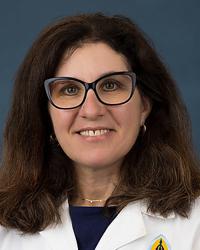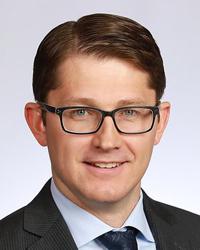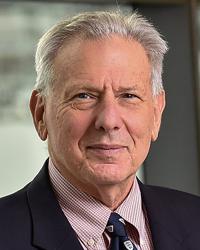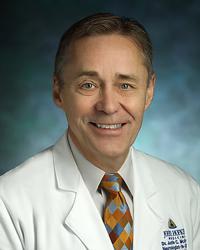Research Lab Results
-
Rachel Levine Lab
The Rachel Levine Lab is interested in physician growth and well-being, best practices for advising medical students, and the experiences of women faculty and medical students in medicine.
-
Alzheimer's Disease Research Center
The goal of the Johns Hopkins Alzheimer's Disease Research Center (ADRC) is to accelerate the discovery of new treatments that are directed at the basic mechanisms of disease, and to hasten the time when effective treatments for AD and related disorders become a reality. We have a strong commitment to basic research regarding the underlying mechanisms of Alzheimer's Disease and related disorders, and how this may translate into effective treatment. We perform clinical research seeking to identify medications to delay or treat the symptoms of dementia. We also provided many educational programs for family members and professionals. -
Jon Russell Lab
The Jon Russell lab focuses on thyroid and parathyroid pathology as well as improving patient safety and education using healthcare technology. Additional focuses include utilizing new technology to advance on the techniques of minimally invasive neck surgery. Current and previous efforts include the development of mobile and web-based applications to educate physicians and patients, utilizing ultrasound for vocal cord imaging, understanding the nuances of advanced thyroid cancer, and exploring the role of scarless thyroid surgery in a North American population.
-
Joseph Carrese Lab
Research in the Joseph Carrese Lab focuses on clinical ethics and professionalism, with a particular interest in medical education and examining ethical issues in the context of cultural diversity. We collaborate with colleagues to design, implement and evaluate educational curricula addressing ethics and professionalism issues in clinical practice.
-
John Sampson Lab
Researchers in the John Sampson Lab investigate relevant, appropriate, affordable and sustainable ways to improve anesthesia and perioperative care in low-resource settings. The team’s research interests include the Universal Anesthesia Machine; interpersonal relationships between anesthesia providers and their patients; how the quality of those relationships impacts professionalism, autonomy, anxiety, patient cooperation and patient satisfaction; how disease influences cerebrovascular reactivity as measured by MRI; and how education and communication can improve medical care in Africa and other austere environments. The team is currently working with clinicians in Ghana, Ethiopia and Kenya. -
James Pekar Lab
How do we see, hear, and think? More specifically, how can we study living people to understand how the brain sees, hears, and thinks? Recently, magnetic resonance imaging (MRI), a powerful anatomical imaging technique widely used for clinical diagnosis, was further developed into a tool for probing brain function. By sensitizing magnetic resonance images to the changes in blood oxygenation that occur when regions of the brain are highly active, we can make ""movies"" that reveal the brain at work. Dr. Pekar works on the development and application of this MRI technology. Dr. Pekar is a biophysicist who uses a variety of magnetic resonance techniques to study brain physiology and function. Dr. Pekar serves as Manager of the F.M. Kirby Research Center for Functional Brain Imaging, a research resource where imaging scientists and neuroscientists collaborate to study brain function using unique state-of-the-art techniques in a safe comfortable environment, to further develop such techniques, and to provide training and education. Dr. Pekar works with center staff to serve the center's users and to keep the center on the leading edge of technology. -
JHU NIMH Research Center
The Johns Hopkins NIMH Center is comprised of an interdisciplinary research team who has pooled their talents to study the nature of HIV-associated neurocognitive disorders (HAND). Their aim is to translate discoveries of the pathophysiological mechanisms into novel therapeutics for HAND.Our objectives are to integrate aspects of ongoing research in HAND and SIV encephalitis; to develop high-throughput and screening assays for identifying novel therapeutic compounds; to use proteomics and lipidomics approaches to indentifying surrogate markers of disease activity; to disseminate information and education about HAND through existing and new educational systems, including the JHU AIDS Education Training Center and the JHU Center for Global Clinical Education and to facilitate the entry of new investigators into neuro-AIDS research, and to catalyze new areas of research, particularly where relevant for drug discovery or the development of validated surrogate markers. -
Charles Wiener Lab
The Charles Wiener Lab primarily conducts research on pulmonary circulation and hypoxia as well as respiratory muscle function in patients with neuromuscular diseases. Our recent studies have included investigating the treatment of pericardial effusions in patients with pulmonary arterial hypertension and examining the use of non-invasive ventilation in patients with amyotrophic lateral sclerosis (ALS). We also have an interest in medical education research. Our work in this area has included reviewing the role of academic medical centers in emerging health care markets.
-
Charles Wiener Lab
The Charles Wiener Lab primarily conducts research on pulmonary circulation and hypoxia as well as respiratory muscle function in patients with neuromuscular diseases. Our recent studies have included investigating the treatment of pericardial effusions in patients with pulmonary arterial hypertension and examining the use of non-invasive ventilation in patients with amyotrophic lateral sclerosis (ALS). We also have an interest in medical education research. Our work in this area has included reviewing the role of academic medical centers in emerging health care markets.
-
Center on Aging and Health
The Center on Aging and Health pursues creative approaches to solve the important health and health care problems for an aging population. Research in our center involves population-based and clinical studies of the causes, correlates, and consequences of aging-related conditions, including frailty, disability, and social isolation. We house four distinct research working groups: the Frailty and Multisystem Dysregulation Working Group; the Family and Social Resources Working Group; the Cognitive and Sensory Functions Working Group; and the Biostatistics, Design and Analysis Working Group. We provide key infrastructure, such as the statistical data core, that supports clinical- and population-based research and education with expertise in research with older adults.




